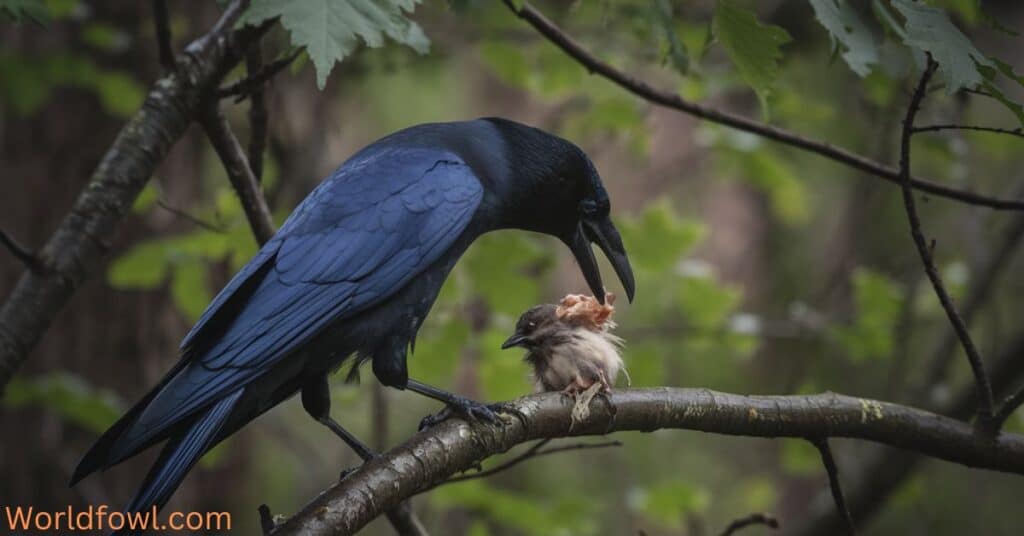In the world of birds, crows stand out as one of the most intriguing and misunderstood species. These intelligent corvids have long fascinated scientists and bird enthusiasts alike with their problem-solving skills and complex social behaviors. But there’s a darker side to these feathered masterminds that often goes unnoticed: their predatory nature. In this comprehensive exploration, we’ll delve into the question that’s been ruffling feathers in the ornithological community: Do crows eat other birds?
The Omnivorous Nature of Crows
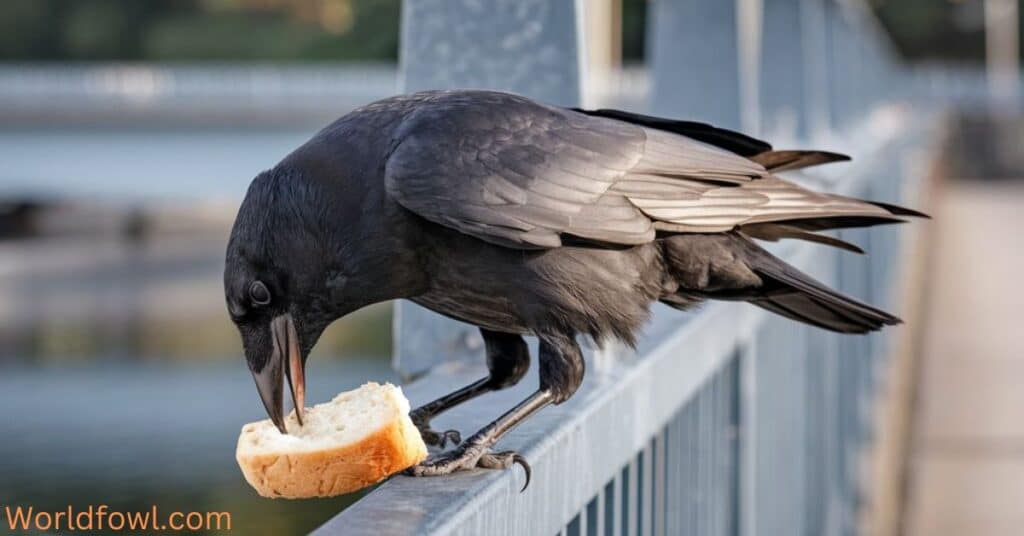
Do crows eat other birds? Before we dive into the specifics of crow predation, it’s crucial to understand the diverse diet of these adaptable birds. Crows are true omnivores, meaning they consume both plant and animal matter. Their menu is as varied as it is surprising, encompassing everything from fruits and nuts to small mammals and, yes, other birds.
Breakdown of a Typical Crow’s Diet
Crows have a reputation for being “garbage birds,” but their dietary habits are far more sophisticated than mere scavenging. Here’s a look at what makes up a crow’s typical diet:
- Plant Matter:
- Fruits (berries, apples, grapes)
- Seeds and nuts
- Grains
- Invertebrates:
- Insects (beetles, caterpillars, grasshoppers)
- Worms and grubs
- Mollusks
- Vertebrates:
- Small mammals (mice, voles)
- Reptiles and amphibians
- Fish
- Birds and eggs
- Human Food:
- Discarded fast food
- Pet food
- Crops (corn, wheat)
As you can see, birds and their eggs are indeed on the menu for crows. However, it’s important to note that they make up only a portion of their overall diet.
you may also like : Do Geese Eat Fish – What Do Geese Like To Eat?
Seasonal Variations in Crow Feeding Habits
Crows are masters of adaptation, and their diet shifts with the seasons. Here’s how their feeding habits change throughout the year:
| Season | Primary Food Sources | Notable Behaviors |
| Spring | Insects, eggs, nestlings | Increased predation on other birds |
| Summer | Fruits, berries, insects | More plant-based diet |
| Fall | Nuts, seeds, scavenging | Food caching for winter |
| Winter | Carrion, human food, cached items | Reliance on scavenging |
During spring, when many birds are nesting, crows often turn to eggs and nestlings as an easy source of protein. This is when their reputation as bird predators is most evident.
Regional Differences in Crow Diets
Do crows eat other birds? Crows are found across diverse habitats, from urban centers to rural farmlands. Their diet varies significantly based on their environment:
- Urban Crows: Rely heavily on human food waste, adapting to city life by scavenging from trash bins and outdoor eateries.
- Rural Crows: More likely to feed on crops, insects, and small animals found in fields and forests.
- Coastal Crows: Often incorporate marine life into their diet, such as shellfish and small fish.
Crows as Opportunistic Predators
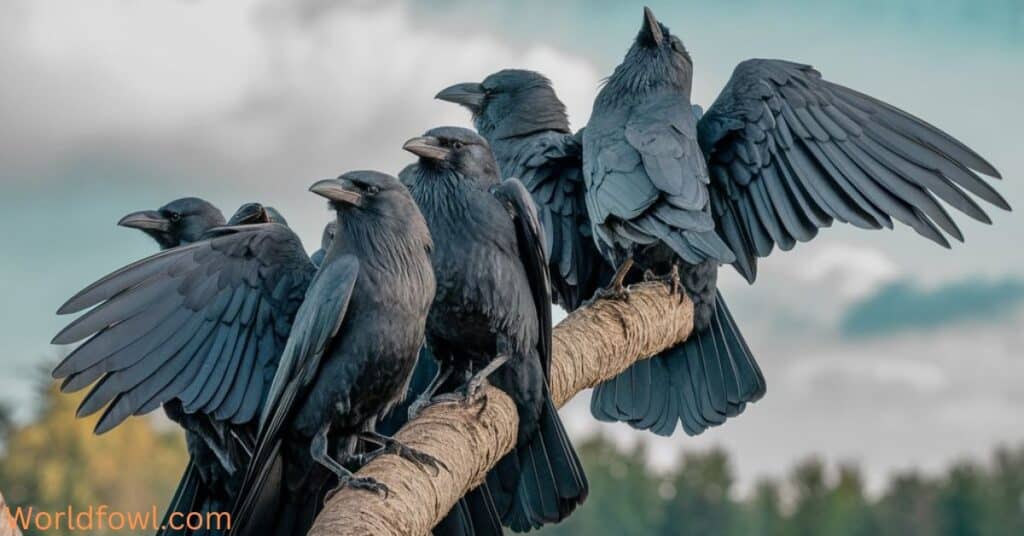
Now, let’s address the main question: Do crows eat other birds? The answer is a resounding yes, but with some important nuances.
Evidence of Bird Predation by Crows
Numerous studies and observations have confirmed that crows do indeed prey on other birds. A study published in the Journal of Avian Biology found that American Crows (Corvus brachyrhynchos) regularly consumed eggs and nestlings of smaller bird species.
“Crows are opportunistic predators that will take advantage of any easy meal, including unattended eggs or vulnerable nestlings.” – Dr. John Marzluff, Professor of Wildlife Science at the University of Washington
Factors Influencing Predatory Behavior
Several factors contribute to a crow’s likelihood of preying on other birds:
- Food Availability: When other food sources are scarce, crows are more likely to target birds.
- Nesting Season: Spring brings an abundance of eggs and helpless nestlings, making them easy targets.
- Habitat: Urban crows may have fewer natural food sources, leading to increased predation on other urban birds.
- Flock Dynamics: Crows often hunt in groups, making it easier to overpower larger birds or raid nests.
Comparison with Other Corvids
Crows aren’t the only corvids known for their predatory behavior. Here’s how they stack up against their relatives:
- Jays: Known for nest raiding, particularly blue jays.
- Magpies: Frequent predators of eggs and nestlings.
- Ravens: Larger and more predatory than crows, capable of taking down bigger birds.
you may also like : Are There Penguins In Alaska? The Mystery of Alaska Penguins
The Bird-Eating Habits of Different Crow Species
Not all crows are created equal when it comes to bird predation. Let’s examine the habits of some prominent crow species:
American Crow (Corvus brachyrhynchos)
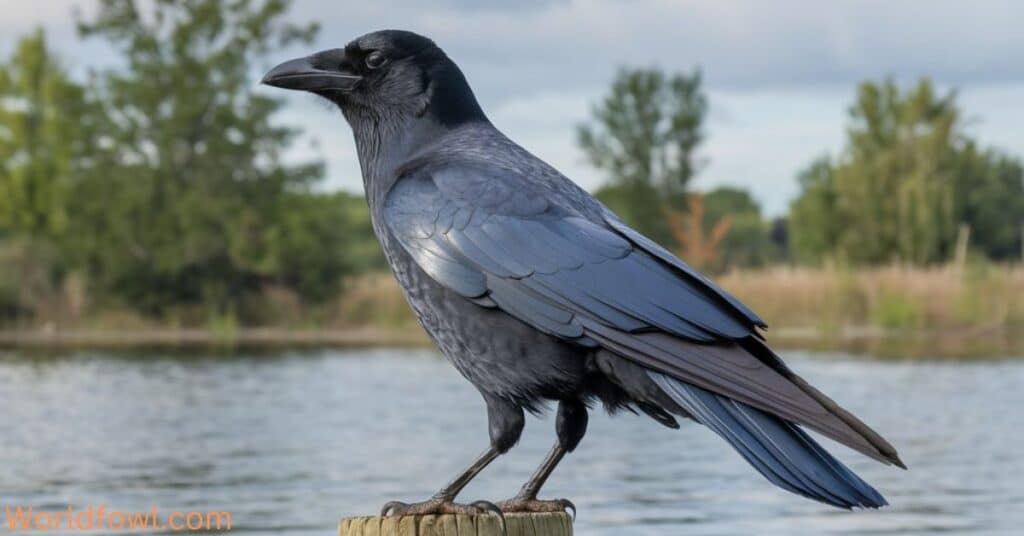
- Most common in North America
- Regularly preys on smaller birds and their nests
- Known to work in groups to mob larger birds
Carrion Crow (Corvus corone)
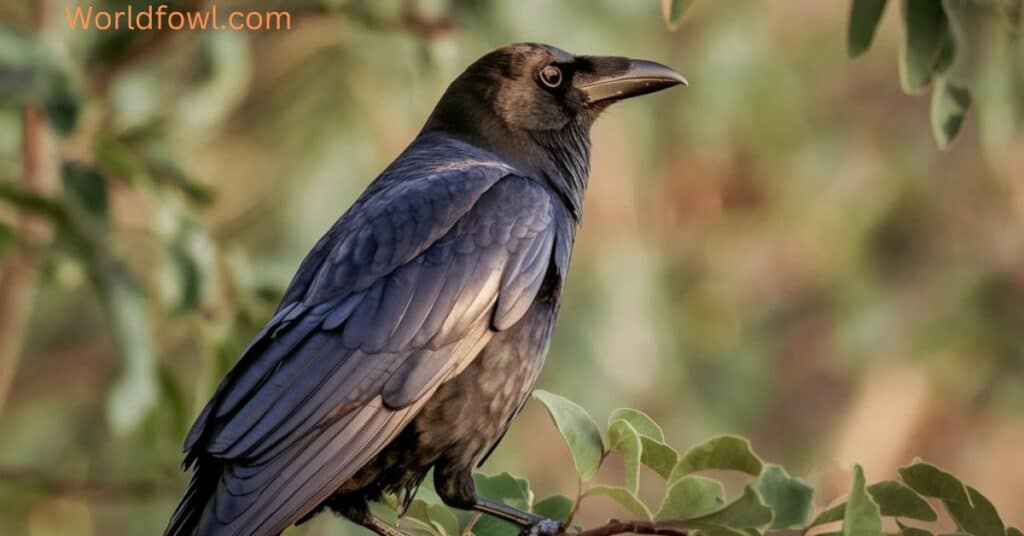
- Found across Europe and parts of Asia
- More likely to scavenge than actively hunt birds
- Still opportunistic predators when the chance arises
Hooded Crow (Corvus cornix)
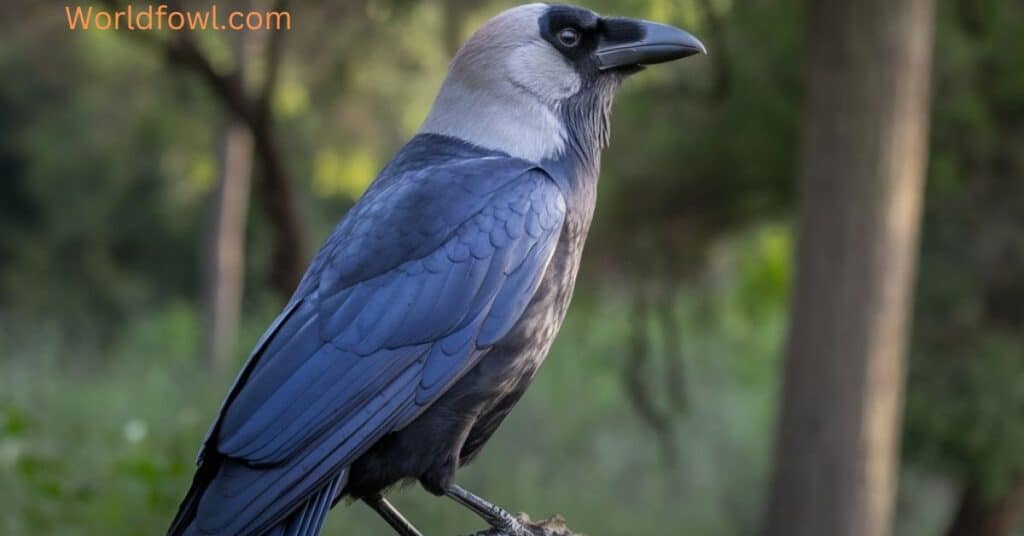
- Native to Northern Europe and Western Asia
- Similar predatory habits to the Carrion Crow
- Known to raid seabird colonies for eggs and chicks
Other Notable Crow Species
- Fish Crow (Corvus ossifragus): Specializes in raiding waterbird nests
- Jungle Crow (Corvus macrorhynchos): Known to prey on a variety of bird species in Asia
Why Crows Target Other Birds
Understanding the motivations behind crow predation helps us grasp their role in the ecosystem.
Nutritional Benefits of Bird Meat
Do crows eat other birds? Birds are an excellent source of protein and fat for crows. Eggs, in particular, are nutrient-dense and easy to consume. This high-quality food source is especially important during breeding season when crows need extra energy to raise their own young.
Ecological Pressures and Competition
In some cases, crows may prey on other birds as a form of competition elimination. By consuming the eggs or young of competing species, crows can reduce competition for resources in their territory.
Opportunistic Feeding During Nesting Season
Spring brings a bounty of easy targets for crows. Unattended nests, helpless chicks, and eggs are all vulnerable to these intelligent predators. Crows have been observed watching parent birds to locate nests and timing their attacks when the nest is left unguarded.
Crows and Nestling Predation
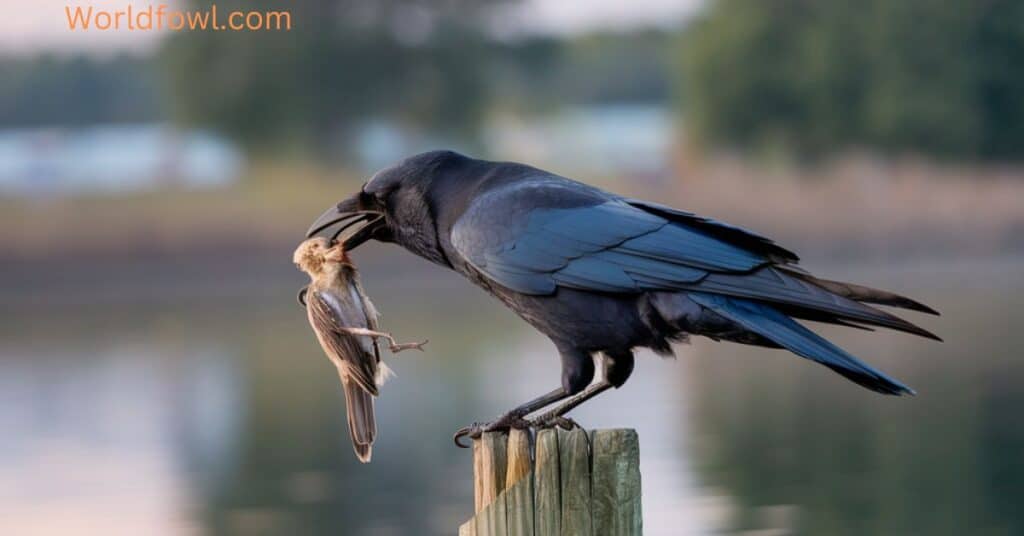
One of the most controversial aspects of crow behavior is their predation on baby birds.
Vulnerability of Baby Birds
Nestlings are particularly susceptible to crow attacks for several reasons:
- Inability to flee or defend themselves
- Loud begging calls that attract predators
- Parents may be away foraging, leaving the nest unprotected
Impact on Local Bird Populations
While crow predation can be disturbing to witness, it’s important to consider its ecological context. In most cases, crow predation is not a significant threat to overall bird populations. However, for some vulnerable or endangered species, crow predation can be a concern.
Defensive Strategies of Parent Birds Against Crows
Birds have evolved various strategies to protect their young from crows and other predators:
- Mobbing: Many small birds will gang up on crows, dive-bombing and harassing them to drive them away.
- Camouflage: Some birds build well-hidden nests or have eggs that blend in with their surroundings.
- Distraction Displays: Parent birds may feign injury to lure predators away from the nest.
you also like : Black-and-white Warbler (Mniotilta varia)
Bird Species Commonly Targeted by Crows
Crows don’t discriminate much when it comes to their avian prey, but some birds are more frequently targeted than others.
Small Songbirds
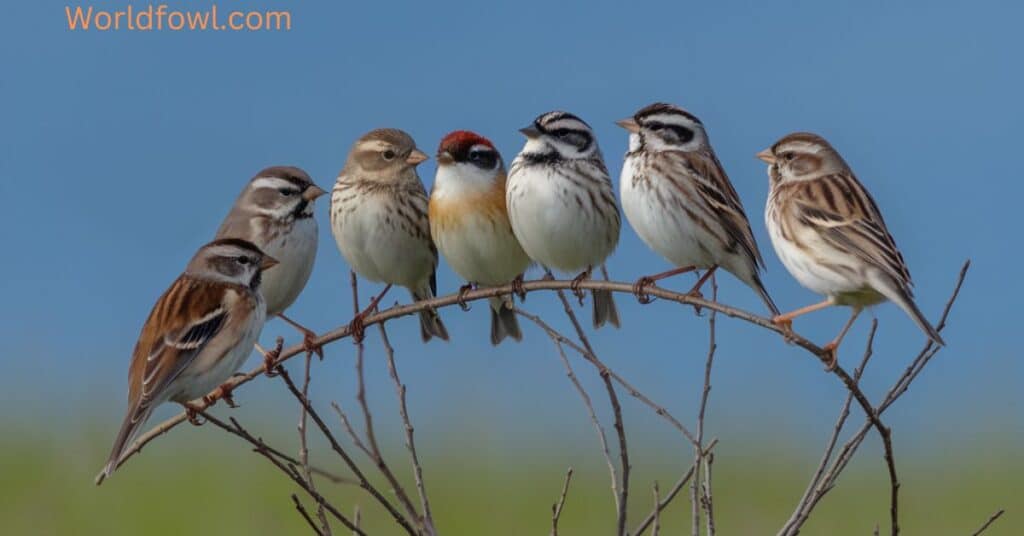
Finches, sparrows, and warblers are common victims due to their small size and often exposed nests.
Game Birds
Quail and grouse nests are sometimes raided by crows, which can be a concern for hunters and conservationists.
Waterfowl
Ducks and geese nesting near water bodies are vulnerable to crow predation, especially during egg-laying season.
Corvid-on-Corvid Predation
Interestingly, crows have been known to prey on the young of other corvid species, including jays and even other crows.
Crows and Domestic Poultry
For those raising backyard chickens, crows can be a potential threat.
Instances of Chicken Predation
While not as common as predation by foxes or hawks, crows have been known to attack chickens, particularly chicks and eggs.
Protecting Backyard Flocks from Crows
To keep your chickens safe from crows:
- Use overhead netting in chicken runs
- Collect eggs promptly
- Provide secure, enclosed nesting boxes
- Use reflective tape or predator decoys as deterrents
Economic Impact on Small-Scale Poultry Farming
For small farmers, crow predation can have economic consequences. However, the impact is generally minor compared to other predators and diseases.
Hunting Techniques of Crows
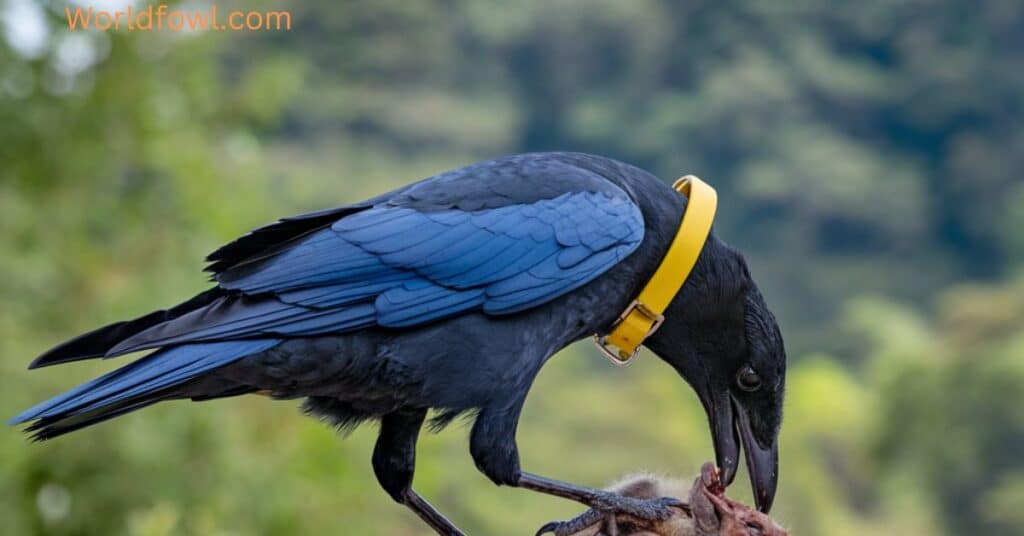
Crows employ various strategies when hunting other birds, showcasing their intelligence and adaptability.
Solo Hunting Strategies
Individual crows may:
- Stalk and ambush ground-nesting birds
- Dive-bomb flying birds to disorient them
- Use stealth to approach nests undetected
Group Hunting Behaviors
Crows often work together, using tactics such as:
- Mobbing larger birds to steal their prey
- Creating distractions while others raid a nest
- Coordinated attacks on adult birds defending their young
you may also like : Birds with Mohawks – Beautiful Birds With Stunning Crests
Use of Tools and Problem-Solving in Predation
Crows are renowned for their tool use and problem-solving abilities. They’ve been observed:
- Using sticks to probe for eggs in hidden nests
- Dropping hard-shelled prey from heights to crack them open
- Learning and remembering the patterns of parent birds to time their nest raids
Cannibalism Among Crows
Perhaps the most unsettling aspect of crow behavior is their occasional cannibalism.
Documented Cases of Crow Cannibalism
While rare, crows have been observed eating members of their own species, including:
- Scavenging dead crows
- Attacking and consuming injured crows
- Raiding crow nests for eggs or nestlings
Factors Leading to Cannibalistic Behavior
Crow cannibalism is often driven by:
- Extreme food scarcity
- Territorial disputes
- Elimination of genetic competition
Evolutionary Perspective on Intra-Species Predation
From an evolutionary standpoint, cannibalism in crows may serve to:
- Ensure survival of the fittest individuals
- Regulate population densities in times of resource scarcity
- Provide a high-quality food source when other options are limited
Ecological Impact of Crow Predation
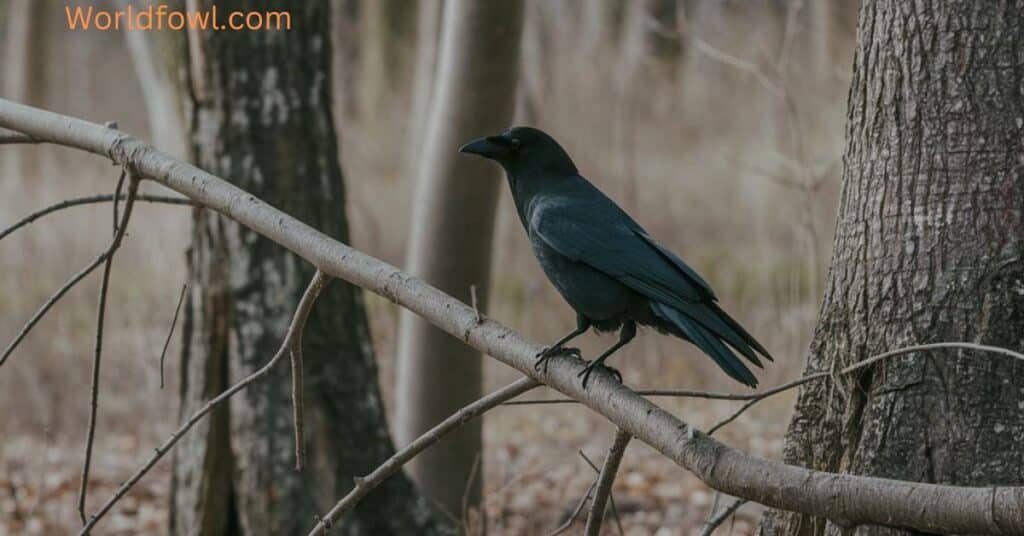
The role of crows as predators has far-reaching effects on their ecosystems.
Effects on Local Bird Biodiversity
Crow predation can influence local bird populations by:
- Reducing numbers of vulnerable species
- Altering nesting behaviors of prey species
- Influencing the distribution of bird species in an area
Role in Controlling Pest Bird Populations
In some cases, crow predation can have positive effects by helping to control populations of:
- Invasive bird species
- Overabundant urban birds like pigeons
Balancing Act: Predator and Prey in Urban Ecosystems
In urban environments, crows play a complex role:
- As predators of smaller birds
- As prey for larger raptors like hawks and eagles
- As scavengers that help clean up urban waste
Human Perceptions and Cultural Significance
Our understanding of crow predation is often colored by cultural beliefs and personal experiences.
you also like : Why Do Crows Chase Hawks? Do Crows Hate Hawks?
Crows in Folklore and Mythology Related to Predation
Many cultures have stories and myths about crows as predators:
- In some Native American traditions, Crow is seen as a trickster and thief
- European folklore often portrays crows as omens of death or bad luck
Modern Attitudes Towards Crows as Predators
Today, opinions on crows are mixed:
- Bird enthusiasts may view them as a threat to beloved songbirds
- Farmers might see them as pests that damage crops and livestock
- Urban dwellers often appreciate their intelligence and adaptability
Ethical Considerations in Crow Population Management
Managing crow populations raises ethical questions:
- Is it right to cull crows to protect other bird species?
- How do we balance the needs of crows with those of other wildlife?
- What role should humans play in managing urban ecosystems?
Conclusion
As we’ve explored, the question “Do crows eat other birds?” has a complex answer. Yes, crows do prey on other birds, but this behavior is just one facet of their diverse and adaptable nature. As opportunistic omnivores, crows play a vital role in their ecosystems, acting as predators, scavengers, and even prey themselves.
Understanding crow predation requires us to look beyond simple categorizations of “good” or “bad” animals. These intelligent birds have evolved to thrive in a variety of habitats, including those heavily impacted by humans. Their predatory behaviors, while sometimes disturbing to witness, are a natural part of the ecological balance.
As we continue to study and coexist with crows, it’s important to appreciate the complexity of their behaviors and the broader ecological context in which they occur. By doing so, we can develop more nuanced and effective approaches to wildlife management and conservation.
FAQs
How often do crows eat other birds?
The frequency varies depending on factors like food availability and season. It’s more common during spring when many birds are nesting.
Can crows be trained not to eat birds?
It’s extremely difficult to train wild crows not to engage in natural behaviors like predation. However, deterrents can be used to protect specific areas or nests.
Do crows pose a significant threat to endangered bird species?
In most cases, no. However, for some vulnerable populations, crow predation can be a concern that requires management.
Are there any birds that prey on crows?
Yes, larger raptors like eagles, hawks, and owls are known to prey on crows, especially younger or injured individuals.
How does crow predation compare to that of raptors?
While both prey on other birds, raptors are specialized predators that rely more heavily on hunting. Crows are opportunistic and incorporate a wider variety of food sources in their diet.

Henry James is a seasoned blogger and a passionate storyteller on “World Fowl.” With years of experience crafting engaging content, he brings a unique blend of expertise and creativity to his writing. Henry specializes in exploring diverse topics with depth and clarity, captivating readers worldwide.

